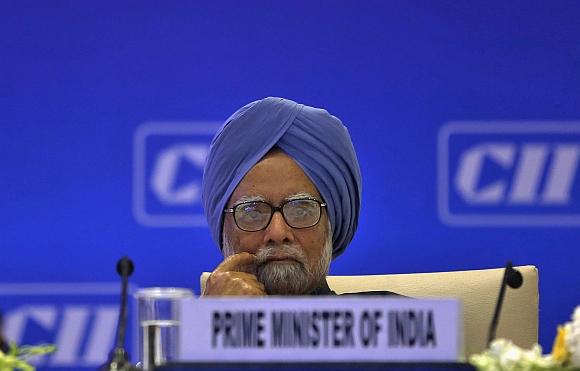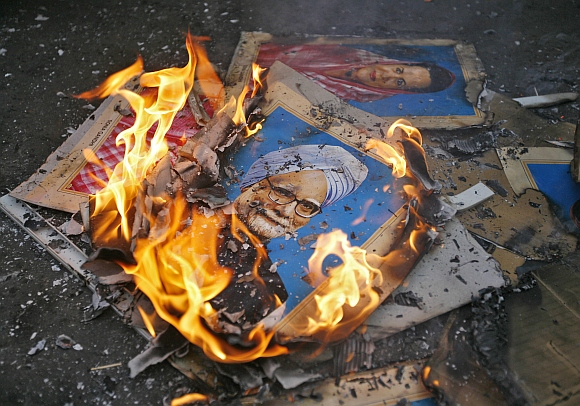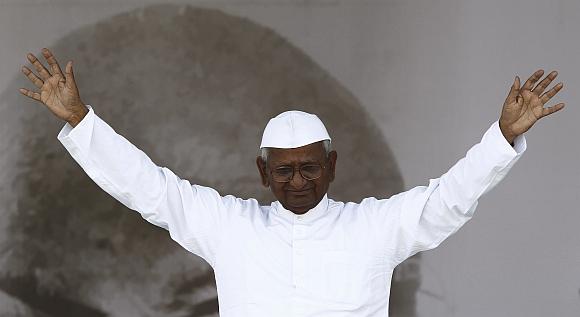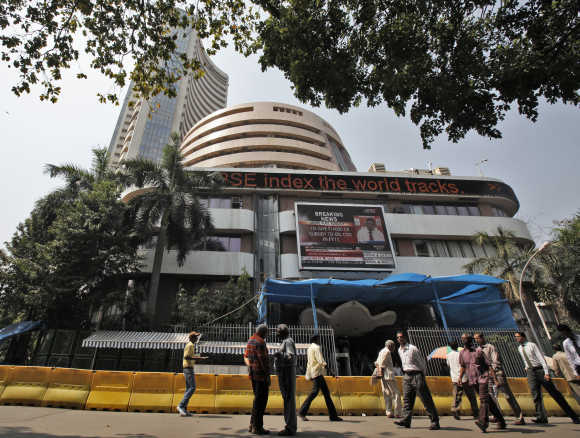Photographs: Adnan Abidi/Reuters Mihir S Sharma
Into his 10 year, Manmohan Singh is struggling to retrieve his legacy -- thanks to bad luck, a bad situation and at least two very bad calls, says Mihir S Sharma
If Manmohan Singh had retired in, say, 2010, his legacy would have been assured. A man who worked his way up from a small Punjab village to Cambridge who became chief economic advisor at 40, Reserve Bank of India governor at 50, and finance minister before 60; and, finally, the only prime minister since Jawaharlal Nehru to be re-elected after completing a full five-year tenure.
Instead, Singh is still prime minister, and his legacy lies tarnished. The middle class that once acclaimed him as the only honest man in politics now bays for his blood, as the Supreme Court nudges the Central Bureau of Investigation in his direction; someone universally respected as a man of soft-spoken integrity is the butt of endless SMS jokes; the face of Indian reforms to the world is now the subject of international news reports about his failures.
Manmohan is, after all, an economist, and he can't run away from the numbers, an array of sinking vital indicators that colours his report card a deep crimson. Quarterly growth rates that were around 8 per cent year-on-year are down to almost half that now. Growth has halved, but inflation has doubled; consumer-price inflation that was around 5 per cent in 2004-05 is now consistently in double digits.
It isn't as if the prime minister and his core economic team don't have reasons for this, though they sound more like excuses. The global slowdown is one - which once they said India was somehow insulated from. The truth is that the pain is self-inflicted, and there is no way that Manmohan doesn't know that.
His government has been assailed by scandal after scandal, but surely it must be its mismanagement of the economy that hits him hardest, for it hits where it hurts most.
That it is mismanagement is clear from the number for the Centre's fiscal deficit under the United Progressive Alliance. Fiscal responsibility has been abandoned, thrown into the dustbin with the Act once supposed to impose it.
High fiscal deficits have three consequences in theory: high interest rates (check), high inflation (check) and a balance of payments problem (double check). In fact, the current account deficit is so high that India is more vulnerable than it has been at any time since 1991.
Odd, indeed, that the man who "saved" India in the crisis of 1991 has led it to the brink of another such. If Manmohan left office tomorrow, he might be remembered less for his response to the crisis of 1991 than causing the crisis of 2013.
...
Why did the PMship ran into trouble?
Image: Portraits of Prime Minister Manmohan Singh and Congress president Sonia Gandhi lie in flames after they were set alit by the demonstrators during a protest in AhmedabadPhotographs: Amit Dave/Reuters
Why precisely is it that Singh's premiership has run into such trouble? What is it about the decisions that his government made that have caused this slowdown? Partly, it simply failed to make tough calls on fiscal management -- raising fuel prices and removing post-financial crisis tax stimulus.
Another popular answer is the burden of Congress president Sonia Gandhi's populist agenda. Yet, the National Rural Employment Guarantee Scheme, for example, has been allocated Rs 33,000 crore in the Budget for 2013-14 -- that's only 6 per cent of the budgeted fiscal deficit for the year.
That isn't exactly what broke the bank.
The real answers are not that easy. Nor is the blame for them easy to portion out - this much for the world, this much for Sonia, this much for Manmohan.
The fiscal deficit is high as a proportion of the gross domestic product because growth has slowed. It is high because fuel prices were politically difficult to raise, because incomes weren't growing strongly -- also because growth had slowed. And growth had slowed because the investment environment had become poisonous. Nobody wanted to put their money into anything, because too much cash was already locked up in unproductive investment.
Too many profit-and-loss accountings had to be changed at the last minute because of unexpected regulatory strictness. Gas-filled pipelines that were supposed to arrive didn't get built, and even where they did, there was no gas to fill them; power that was supposed to allow plants to produce somehow went missing.
The sudden poisoning of the investment climate in the UPA-II was a direct product of the overexcitement that marked the UPA-I. And for that Manmohan bears some direct blame.
When the UPA first came into power, plans were hatched; India would become a power-surplus country by 2015, for example. That needed a vast amount of investment in power-plant capacity. And it needed vast amounts of fuel. Time was short. Coal would be provided. Gas would arrive. Build plants, and it would come.
The desire to build India's infrastructure in double-quick time was Manmohan's call. He also argued the Indian state simply didn't have the money or the ability to build as much infrastructure as was needed.
The private sector would have to do much of it, and so the second-most common three-letter acronym in the UPA era became "PPP" (public private partnership). The public sector provided inputs and permissions; the private sector provided expertise and capital; and the result was supposed to illuminate India.
It hasn't turned out that way at all. Government departments didn't play along and delayed permissions. The private-sector participants played fast-and-loose with requirements; a government stuffed with supposedly brilliant lawyers couldn't write even one watertight contract. Enormous amounts of inputs - land, coal, gas, spectrum -- were being assigned cheaply in order to get infrastructure moving. And, unsurprisingly, people tried to make money off the process.
It is impossible to imagine that manmohan wasn't aware of the possibility that coal-block allocations, for example, could have been fraudulent. But, seen in this context, it's obvious that his hurry to build a power-surplus India was so great that the processes could not be paused while more tamper-proof ones were installed.
The policy call that Manmohan took in 2004 -- and, again, practically nobody objected strenuously at the time -- failed to deliver the infrastructure it promised. But it did deliver corruption because there was simply insufficient regulatory capacity in the government system to deal with this vast expansion of the state's ambitions.
...
As Manmohan's model failed, the vultures gathered
Image: Anti-corruption crusader Anna HazarePhotographs: Reuters
The Congress conceives of itself as the largest NGO in India, and it tends to behave as if all other NGOs are its natural allies. True, many of UPA's finest legislative moments - the Right to Information, for example -- have emerged from its NGO affiliates.
But the later years of UPA reveal what happens when civil society turns on the hand that feeds it. NGOs' inside man in the government, Environment Minister Jairam Ramesh, openly defied the prime minister and stalled project after project -- confident in the Gandhis' backing.
This slowdown is Ramesh's as much as it is Singh's -- and perhaps some of it is Anna Hazare's as well. The anti-corruption campaigners created an all-pervasive atmosphere of distrust and fear, causing files all across New Delhi to remain unpushed.
The Supreme Court, egged on by litigants who were comrades-in-arms of the Hazares and the Arvind Kejriwals, cancelled licences and delivered itself of thundering rebukes to capitalism. The Comptroller and Auditor General used irrational benchmarks to calculate imaginary losses from the reduced-price input policy, and activists trumpeted that non-existent "money" as stolen.
As Manmohan's model failed, the vultures gathered.
Where could Manmohan have stepped in to arrest the slide? The conventional, tired case against him is that he provided insufficient "leadership" -- he allowed his colleagues to defy him, to make money on the side, of letting corruptible processes persist.
As the letters between the Prime Minister's Office and the telecom ministry during the 2G spectrum-allocation process in particular make clear, Manmohan was more than perceptive enough to know when something was going wrong.
But he restricted himself to writing letters -- letters that stopped when then Telecom Minister A Raja managed to make enough of a case that the policy was his business, not the prime minister's.
Ramesh, too, made the point that his ministry's business was his own; and so has his successor in the environment ministry, Jayanthi Natarajan, when an attempt was made to create emergency short-cuts to procedures. Manmohan is a man who once, holding Cabinet rank, was publicly insulted by an arrogant prime minister as leading "a bunch of jokers".
Singh has not repeated Rajiv Gandhi's mistake. Most think he's overcompensated.
But, in the end, in a Cabinet system such as India's, the prime minister has a sole source of real power over his colleagues in the Cabinet - the ability to hire and fire them. And that is where the conditions of Singh's job have gotten in his way. Hiring and firing people is the prerogative of Sonia.
So Manmohan couldn't even keep Raja out of his Cabinet in 2009. The real point at which Singh could have stepped in to arrest the rot? When Ramesh first defied him. But Manmohan was a CEO who wasn't allowed to pick his own team; the proprietor did so for him. In this system of government, that can be a recipe for disaster.
...
His mistake was assuming high growth would survive
Image: A view of the Bombay Stock ExchangePhotographs: Danish Siddiqui/Reuters
Manmohan may have had a few things that he wanted to achieve. He wanted to build India's infrastructure, in partnership with the private sect#8744 that effort has failed, thanks to its own internal contradictions.
He wanted to re-orient India to the world through the painful process of the civil nuclear agreement with the United States; that has to an extent succeeded. He wanted peace with Pakistan; that was undermined first by Pakistan's deep state and then by the Congress, which humiliated him after Sharm-el-Sheikh.
Instead, he is now, in 2013, stuck with a few assured months left in office, and all he can try to do is to make sure economic fundamentals don't collapse to pre-1991 levels. Perhaps Manmohan's greatest mistake was to assume that high growth would survive, come what may.
Instead, India's growth story has been shown to be fragile at best. But has the architect of liberalisation destroyed it? It is difficult to imagine anyone else, over these past few years, and even with the constraints of his job, being able to do as little as Manmohan has. But, on the other hand, it is also difficult to imagine anyone doing much more.






article